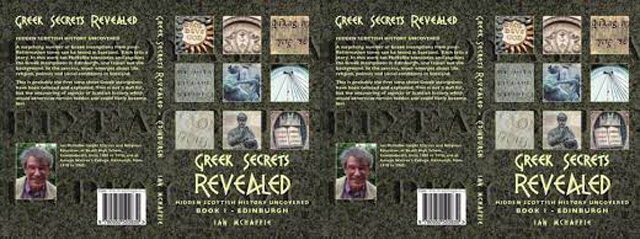Greek Secrets Revealed: Hidden Scottish History Uncovered Book 1 – Edinburgh
Book review

Greek Secrets Revealed: Hidden Scottish History Uncovered Book 1 – Edinburgh, Ian McHaffie, self-published, 2022, 200p, £12-00 [including p+p]. ISBN 978-0-9546681-7-4. Copies can be ordered via mchaffie1@incloud.com
Professor W. G. Hoskins once commented that one of the principal joys of local history was its inter-disciplinary nature. He could see how a multitude of disciplines could make their contribution to how local history is studied and formed. This book by Ian McHaffie confirms that judgement.
This book does more that its title suggests. It sets out from the premiss that Edinburgh was indeed the ‘Athens of the North’, a cultural phenomenon in many respects, and then explores what can be observed by an inquisitive visitor. Its central intention, motivated by his background as a classicist, is to highlight the degree to which classical Greek references and quotations appear in the Edinburgh landscape. These range from examples at the Edinburgh Castle Hospital to the High Kirk and Canongate Churchyard in the Royal Mile to Cramond Kirk. These are generally quite brief literary allusions, amidst a great deal more Latin phraseology. These can be dated from the eighteenth century onwards so they reflect a classical understanding and awareness but do not, as might occur in a museum, actually physically emanate from the era to which they allude.
Modernists might easily dismiss this as rather pretentious in its attempt to emphasise Edinburgh’s status as a cultural centre. In reality, however, it is part of a phenomenon with which we are familiar. For examples, most of our cities and towns have Latin mottos, such as Leicester’s ‘Semper Eadem’; many of us attended schools with Latin mottos, such as ‘Semper Recordemur’ at Selhurst Grammar School; and those of us who were exposed to the rigours of A Level Latin find themselves interspersing their language with occasional Latin phrases.
At every turn, literally, Ian McHaffie guides us into the wider context in which each Greek reference has been positioned. That is why it is clearly a survey of Edinburgh’s local history as much as a cultural commentary.
The inclusion of a photograph of the memorial to Ioannis Polites in Seafield Cemetery can emphasise the value of using this book. Polites, a seaman in the Royal Hellenic Navy, died in the Southfield Sanitorium in 1945. This Greek sailor, about whom little is really known, was buried with a quotation from Pericles, c430BC - ‘of famous men, the whole earth is their tomb’- inscribed in Classical Greek on his standard-design Commonwealth War Graves Commission headstone. This single glimpse draws together cultural tradition, our internationalism, and our remembrance of those who served, and then sets it splendidly in a local history context.

